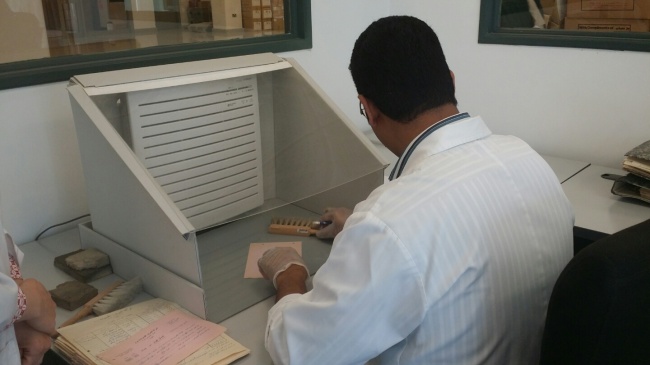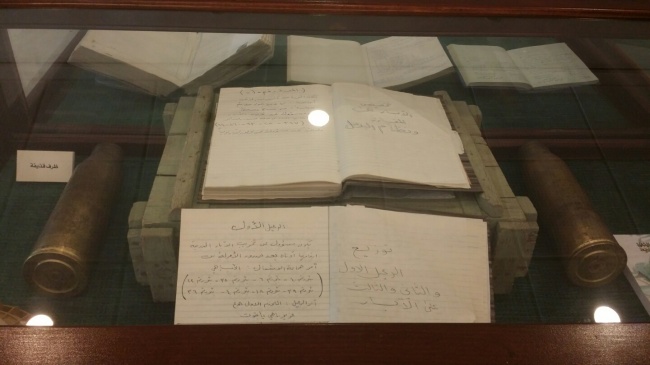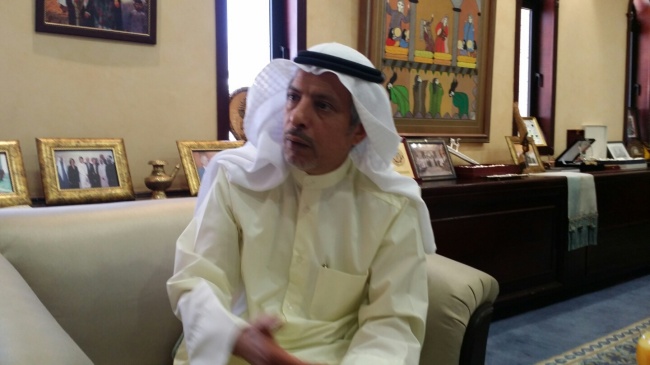KUWAIT CITY -- Fifteen years since the end of the Gulf War, it is hard to see any remnants of the devastation in Kuwait City, the capital of Kuwait that was invaded by Iraq in 1991 by its then-leader Saddam Hussein.
But there is one place that provides a rare glimpse of the war. Located downtown, the Center for Research and Studies on Kuwait holds millions of documents found during the war -- including secret documents written by the Iraqi Force to order its army to march toward the border.
 |
An employee at the Center for Research and Studies on Kuwait uses a brush to recover a document during the Gulf War. Yeo Jun-suk/ The Korea Herald |
“These document help us spread out the words so that other countries will better understand our history and culture,” said the head of the center Abdullah Y. Alghunaim. These war documents were recovered by librarians, published as books and translated into dozens of foreign languages.
 |
Retrieved documents from the Gulf War. Yeo Jun-suk/ The Korea Herald |
The 12-story building epitomizes Kuwait’s outreach efforts to the international community that helps the small Middle East country surrounded by regional power brokers transform into the most politically and economically stable country in the area.
Among the neighboring states, Kuwait is considered one of the most developed countries in terms of political freedom and economic prosperity. The oil-rich nation is the fourth richest country in the region based on per capita gross domestic product and is ranked the freest in terms of civil liberties and political rights.
One of the nation’s signature diplomatic initiatives is loan-free foreign aid programs.
“If you help someone in need, they won’t forget you. This is very much about the idea of why we are trying to help poor nations,” said Hesham I. al-Waqayan, deputy director general of Kuwait Fund for Arab Economic Development, a government agency established in 1961 to oversee the nation’s foreign aid program.
 |
Hesham I. Al-Waqayan, a deputy director general of Kuwait Fund for Arab Economic Development. Yeo Jun-suk/ The Korea Herald |
Aid programs by the Kuwaiti government date back to 1953. Initially focused on offering relief to neighboring Arab countries such as Oman and Bahrain, the government expanded them to other countries including Vietnam and Bangladesh over the years.
The list also includes an unlikely candidate from halfway around the world: North Korea. The veteran aid expert said that the agency’s aid workers visited North Korea in 2003 to provide residents of the reclusive regime with more access to clean water.
“In 2003, only 7 percent of Pyongyang residents had access to clean water,” he said, adding that three years later the situation drastically improved. The $20 million water project continued until criticism emerged from the international community that the aid could be diverted to programs of weapons of massive destruction.
As a country with a population of just 4.2 million with consistent geopolitical risks and threats, foreign affairs have played a large part in helping Kuwait fend off the invasion of regional powers and maintaining economic and political prosperity.
Ever since Kuwait was liberated from the annexation of Iraq by the coalition forces of 34 nations led by the United States, the nation has beefed up its efforts to enhance multilateral ties by playing a mediating role in regional and international disputes.
One of those initiative is hosting a pledging conference for Syria, which has been ravaged by the civil war that has left more than hundreds of thousands dead and millions displaced. Since 2013, Kuwait has hosted the event and donated $120 million by 2015 to help the refugee.
Local media outlets, which is said to enjoy broader freedom of speech than any other states in the region, has hailed the nation’s foreign affair policies as a cornerstone of economic and political stability.
“If I have to speak one thing that makes me praise our government policies, it is diplomacy. We would not have sustained without proactive foreign policy,” said Abd al-Rahman Alyan, editor in chief of Kuwait Times, the first English newspaper in the Persian Gulf region.
Kuwait’s proactive diplomacy is also used as a strategy to ease its reliance on oil. The OPEC’s fifth-largest oil producer aims to diversify its economy dominated by petroleum industry, which accounts for half of the GDP and 95 percent of export revenue. The government projects a record budget deficit for the 2016-2017 fiscal year.
One strategy encouraged by the government is to attract overseas investment and put the money into the non-oil sectors. The Kuwait Direct Investment Promotion Authority said that they would seek to promote housing, medical and green industries.
To this end, the KDIPA said that it would simplify the process of obtaining investment licenses, adopt transparent rules for granting business incentives and allow foreigners to seek 100 percent ownership of companies in Kuwait.
“Using our extensive international relation network in various countries around the world, we have adopted a proactive approach in the FDI strategy,” said Mohammed Yousef Yaqoub, assistant director general for business development affairs for the KDIPA.
By Yeo Jun-suk (
jasonyeo@heraldcorp.com)
Korea Herald correspondent










